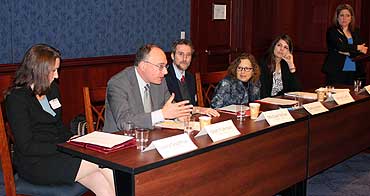« March 2012 Issue
Engaging Hospitals in Efforts to Improve Access to Care

From left to right: Laura Goodhue, Florida CHAIN; Matt Fishman, Partners HealthCare; Michael Miller, Community Catalyst; Cathy Levine UHCAN Ohio; Jessica Curtis, Community Catalyst; Amy Rosenthal, Community Catalyst
With medical debt on the rise, how can non-profit hospitals partner with communities to address this issue? In January, Community Catalyst brought together state consumer advocates, hospital representatives and legislative staffers for a Congressional briefing to address that question. The briefing, coordinated by Senator Richard Durbin's (D-IL) office, explored how non-profit hospitals, which have federal obligations to provide benefits to their communities as a result of their tax exemptions, can help financially strapped families access health services through financial assistance (charity care) programs. The Affordable Care Act now requires non-profit hospitals to meet certain criteria for financial assistance.
Matt Fishman, vice president of community health at Partners HealthCare, shared the success Partners has had working with advocates at Health Care for All in Massachusetts to improve the hospital system's policies on providing financial assistance to uninsured patients. While the hospital and the non-profit group could have been adversaries in ensuring financial assistance requirements were met, by choosing to work together they were able to achieve a common goal: helping people enroll in insurance and giving them access to consistent care outside of the emergency room.
"Keeping patients as healthy as possible is what's best for them, but it also helps the hospital," Fishman said, explaining that keeping patients healthy, particularly by checking to see if patients are eligible for insurance programs and connecting them to primary care, ultimately saves the hospital money.
While the partnership between advocates and hospitals has worked in Massachusetts, advocates from Ohio and Florida told a different story: many non-profit hospitals in their states aren't fulfilling their commitment to communities.
Laura Goodhue, Executive Director of Florida CHAIN and Cathy Levine, Executive Director of Universal Health Care Action Network of Ohio, shared stories about people in their states who have gone into medical debt because they weren't offered financial assistance from their hospital despite being eligible.
They stressed that strong guidance is needed from the IRS, which is charged with developing rules to implement the new policies, to ensure that non-profit hospitals fully understand their responsibilities and to help advocates hold non-compliant hospitals accountable.
There are four million uninsured people in Florida, while the ACA will help ensure health care access to many Floridians, many will still turn to the emergency room for care, Goodhue explained.
"Without full community benefit implementation, it will mean continued high medical debt," said Goodhue. "Without strong regulations and their adoption, progress goes away."
Community Catalyst brought together this diverse group of stakeholders to show that non-profit hospitals and advocates can work together to expand access to care and improve the health of community members, and that strong federal implementation of the ACA's community benefit requirements can pave the way for that collaboration.
